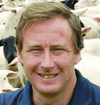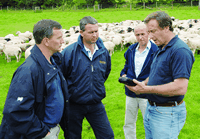Sheep Farmer of the Year Finalist – Peter Baber

Peter Baber
Weir Park Farm, Devon
* Peter Baber isn’t your typical pedigree breeder. He didn’t inherit a pedigree flock, he’s not attempting to create a flock capable of clinching prize tickets at shows and he isn’t selling stock for thousands of pounds.
He simply wants to breed terminal sires more suited to commerical flocks. But this came about out of frustration. “We were finding rams weren’t doing what we wanted them to. They weren’t lasting, failed to serve sufficient ewes and couldn’t survive under our management system.”
For Peter sheep breeding isn’t about the size of a ram’s ears or the dome of its head. It is, however, about mixing the best
Farm facts |
|---|
|
This in itself makes Peter something of a visionary among breeders. Indeed many pedigree flocks are now heading down similar routes.
And his latest move, as a founder member of the Sheep Improvement Group in the south west is testament to this vision. “What we as a group are trying to create is a prolific, well-fleshed, wool shedding sheep with easy lambing characteristics.”
Having started with 40ha of rented grazing, Peter has now expanded to the point where his flock is run over 120ha and numbers 650 ewes consisting of pedigree flocks of Texels, Suffolks and Frieslands.
Most of the land used by the flock is owned by recreational landowners. “While a lot of these landlords don’t require any rent, they do tend to stipulate management criteria largely based on environmental concerns and lifestyle issues.”
This means that while the farm doesn’t participate in any environmental schemes Peter does practice the highest level of environmental management, applying little to no artificial fertilisers or sprays.
And, in line with his aim to breed a more commercial type of terminal sire the flock, including rams for sale, is fed no concentrates. “I want to sell sheep capable of serving at least 100 ewes a season without losing excessive condition and needing to be fed to recover from tupping.”
As a stated desire it’s a big ask, particularly when most farmers still buy on looks alone, but it’s one he’s determined to execute.
This, Peter reckons, is where performance recording and proactive marketing plays a big role. All ewes are performance recorded with the aim of improving estimated breeding values year on year, something which is currently being achieved.
 On the marketing front all existing and potential customers receive a newsletter explaining how the sheep are bred and listing all available rams together with their performance data and price – an approach favoured by few others, but one which avoids the need for Peter to attend any sales.
On the marketing front all existing and potential customers receive a newsletter explaining how the sheep are bred and listing all available rams together with their performance data and price – an approach favoured by few others, but one which avoids the need for Peter to attend any sales.
In line with the minimal input ethos, the farm is also, unlike many others, not a machinery salesman’s paradise. It operates with three main pieces of kit, a pick-up, a livestock trailer and a quad bike, helping keep fixed costs down to the bare minimum and maximise profit margins which in recent years have stood at more than £18 a ewe.
Away from the farm Peter has for a number of years been active in farming politics, taking on roles within NSA, SCOPS, Meat South West and numerous other sheep industry initiatives.
WHAT THE JUDGES LIKED |
|---|
|
Sheep Farmer of the Year Finalist
